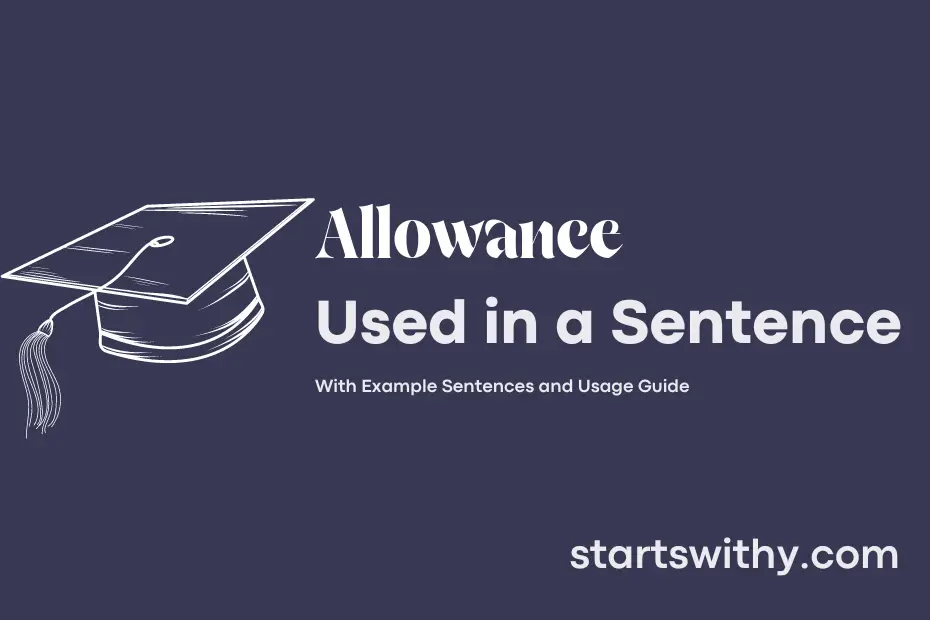Are you curious about how to properly use the word “allowance”? An allowance refers to the amount of something that is permitted or given on a regular basis. It typically involves granting permission, typically in a financial or official context.
Understanding how to incorporate “allowance” into your vocabulary can enhance your communication skills and ensure clarity in your messages. Whether discussing financial allowances, time allowances, or other forms of permissions, mastering the usage of this term can help you convey your thoughts effectively. Let’s delve into how this versatile word can be utilized in various contexts and sentences.
7 Examples Of Allowance Used In a Sentence For Kids
- Allowance is the money your parents give you to spend.
- I save my allowance to buy toys I like.
- Always remember to ask your parents before spending your allowance.
- Spend your allowance wisely on things you need.
- My allowance helps me learn how to manage money.
- Do your chores to earn your allowance.
- It is important to be grateful for the allowance you receive.
14 Sentences with Allowance Examples
- Allowance for college students in India is often used to cover basic necessities such as food and transportation.
- Getting a monthly allowance from parents can be helpful for college students to manage their expenses.
- Some college students may use their allowance to indulge in occasional treats like eating out with friends.
- A regular allowance can give college students the freedom to explore different hobbies and activities.
- It is important for college students to budget their allowance wisely to ensure it lasts throughout the month.
- Saving a portion of their allowance can help college students build good financial habits for the future.
- College students may need to negotiate with their parents for an increase in their allowance to accommodate rising costs.
- A fixed allowance can teach college students the value of money and the importance of making thoughtful spending decisions.
- College students receiving a generous allowance may choose to invest some of it in building their personal savings.
- The allowance given to college students can vary depending on their family’s financial situation and individual needs.
- College students may find it challenging to manage their allowance effectively, especially if they have never had to budget before.
- Balancing social activities and academic needs with a limited allowance can be a struggle for many college students.
- Some college students may choose to work part-time to supplement their allowance and gain valuable work experience.
- College students who responsibly handle their allowance may develop a sense of financial independence and self-discipline.
How To Use Allowance in Sentences?
To use the word Allowance in a sentence, you should first understand its meaning. An allowance is a fixed amount of money that is given on a regular basis, usually for a specific purpose like personal expenses or as a gift.
When constructing a sentence with Allowance, start by identifying who is receiving the allowance and why. For example, “My parents give me a weekly allowance to buy lunch at school.” In this sentence, the word Allowance is used to describe the money given to the speaker by their parents for a specific purpose, which is to buy lunch.
Remember to use Allowance as a noun in a sentence, as it represents a specific amount of money allotted for a particular use. Avoid using it as a verb or adjective, as it may cause confusion about its intended meaning.
It’s essential to provide context when using Allowance in a sentence, so the listener or reader understands how the money is being used and why it is being given. Practice including Allowance in various sentences to become more comfortable using it correctly in conversation or writing.
Conclusion
In summary, sentences with the keyword “allowance” highlight situations where permission, a specific amount of money, or a sum of something is given. These sentences indicate instances like children receiving a weekly allowance, individuals being granted leave from work, or the flexibility allowed in a budget for expenses. The term “allowance” signifies an allocation or authorization, emphasizing the idea of granting or permitting something within specified limits. Through these examples, it is evident that an allowance can refer to a variety of contexts where a certain degree of freedom or provision is allowed, demonstrating the flexibility and control involved in such scenarios.



